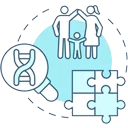




Clinical trials are a beacon of hope for patients who have exhausted conventional treatments. They evaluate the safety and effectiveness of innovative therapies like targeted medicines and immunotherapies. By participating in clinical studies, patients gain access to advanced treatments and contribute to the development of new options. At MediPocket USA, we understand the transformative impact of clinical trials on cancer care. Our mission is to connect patients with cutting-edge treatments and shape the future of cancer care through clinical trials in the United States
We are connected to almost all the world’s top research institutes, hospitals, and research centers in the USA.
Contact Premium MediPocket USA to express your interest in our medical services. Provide with your medical documents, including any relevant reports, test results, and doctor's recommendations.
After receiving your medical documents, MediPocket USA team will evaluate your case to understand your medical condition and treatment needs. We then create personalized clinical trial reserach action plan.
Service fee is required for team to do research, contacting, submitting medical records and cordinating with many clinical trial programs all over USA, it is very intense process. Ans find one that accepts international patients with particular stage of disaese and trial phase.
We work for international patient all requirments and coordination to match and get them accepted with best suitable clinical trial program in USA. After acceptance patient is provided with detailed instructions and sterps for coming and have in-person medical clerance for acceptance in program
We help international patients with the medical visa to travel and provide all supporting medical letter from program for patient to get hassel-free and expedited visa to travel. If patient further wants can take our ‘Conceirge Services’ for complete assistance in United States from transportation to accomadiotion to food and hospital appointments and visits.
Clinical trials have four stages that are used to evaluate a drug, determine the proper dosage, and check for side effects. If studies conducted in the first three phases show that a drug is safe and effective, the FDA approves it for clinical use and continues to monitor its effects.
A Phase I trial evaluates an experimental treatment on a small group of often healthy people (20 to 80) in order to determine its safety and side effects, as well as the appropriate drug dosage.
A Phase II trial employs a larger number of people (100 to 300). While Phase I is focused on safety, Phase II is focused on effectiveness. This phase seeks preliminary data on whether the drug works in people with a specific disease or condition. These trials are also studying safety, including short-term side effects. This stage can last for years.
A Phase III trial collects more information about the drug’s safety and effectiveness by studying different populations and dosages, as well as using the drug in combination with other medications. The number of subjects typically ranges from a few hundred to around 3,000. If the FDA agrees that the trial results are positive, the experimental drug or device will be approved.
After the FDA has approved the use of a drug or device, a Phase IV trial is conducted. The effectiveness and safety of a device or drug are evaluated in large, diverse populations. Sometimes the side effects of a drug are not apparent until many people have used it for a longer period of time.
Step 1: Eligibility and Registration: The first step is to see if you are eligible to participate in the training. Who is eligible may be determined by disease type, stage, previous treatments, and general health. If you meet the requirements, you can proceed with enrollment.
Step 2: Informed Consent: Before participating in a clinical trial, you will be given extensive information about it, including its purpose, potential risks, and benefits, how it will be carried out, and how long it will last. This ensures that you are fully informed about what is going on and that you can give your consent based on that knowledge.
Step 3: Screening and Starting-Point Assessments: After you sign up, you will be subjected to a series of screenings and preliminary tests. These tests help determine how the intervention affects your health and serve as a baseline for the rest of the study.
Step 4: Randomization and Treatment Assignment: In some studies, people are randomly assigned to different treatments. Randomization aids in ensuring that the outcomes are fair. You may be given either the standard or experimental treatment.
Step 5: Treatment and Monitoring: During the trial, you will receive the treatment that has been selected for you while the study team closely monitors you. Regular tracking and follow-up visits are required to determine how well the treatment is working, address any side effects, and monitor your progress.
Step 6: Data Collection and Analysis: During the trial, data will be collected through physical exams, lab tests, imaging scans, and quality-of-life assessments. The research team will look at these numbers to determine how safe, effective, and important the treatment is in general.
Step 7: Complete the Trial and Stay in Touch: You will no longer be a part of the trial once it is completed. Long-term follow-up, however, may be required to track any potential late effects or determine how long the treatment lasts and how it affects mortality rates.
Participating in a clinical trial is a significant decision that can help advance disease research and improve treatment outcomes. Before embarking on this journey of hope and progress, it’s critical to discuss any concerns with your doctor and the study team and ensure you have all of the necessary information.
Participating in clinical studies in the United States can help both people with disease and the medical community as a whole in a number of ways. Here are some key advantages:
Access to cutting-edge medicines: Clinical trials give people access to new treatments that are not yet available to the general public. These might include new drugs, therapies, or medical gadgets that might work better or have fewer side effects than what’s already available.
Better quality of care: People who take part in clinical trials often get great medical care from doctors and nurses who specialise in disease research and have a lot of experience. This can lead to better tracking, more frequent follow-up, and more personalised treatment plans.
Potentially better results: The goal of clinical studies is to improve cureent treatments and, in the long run, make things better for patients. By taking part, you have the chance to help make new, possibly more effective cancer treatments, which could help not only you but also other people who get disease in the future.
Comprehensive evaluation: Clinical trials have a strict evaluation method that includes thorough assessments, monitoring, and data collection. This can help you learn more about your type of cancer, how it responds to treatment, and other things that might affect your outlook.
Multidisciplinary approach: In many clinical trials, teams of oncologists, surgeons, radiologists, and other experts from different fields work together. This way of working together makes sure you get the most thorough and well-coordinated care possible.
Extra help and resources: Clinical trials often offer extra help and resources, like counselling, educational tools, and ways to deal with side effects or improve emotional health. These tools can make your general experience better and help you deal with the problems that come with cancer treatment.
Costs: In some cases, the costs of the new treatment or procedure being studied may be paid for by the clinical study. Some trials may also pay you money or refund you for some of the costs you have to pay to take part.
Contribution to scientific knowledge: When you take part in a clinical study, you help scientific knowledge in the field of disease research move forward. Your participation helps researchers and health care workers learn important things about how to treat disease and could shape future standards of care.
It’s important to remember that taking part in clinical trials also comes with some risks and things to think about, which varies from trial to trial. Before deciding to take part in a trial, it’s best to talk to your healthcare team about the possible benefits and risks and carefully look over the trial’s details.

Clinical trials investigate new treatments, therapies, and prevention strategies for various types of cancer, such as breast cancer, lung cancer, prostate cancer, and leukemia.

Clinical trials aim to develop interventions and therapies for rare diseases, including genetic disorders, autoimmune conditions, and neurological disorders.

Clinical trials explore new approaches for managing and treating heart diseases, such as coronary artery disease, heart failure, and arrhythmias.

Clinical trials investigate potential treatments and interventions for neurological conditions like Alzheimer’s disease, Parkinson’s disease, multiple sclerosis, and stroke.

Clinical trials focus on developing vaccines, antiviral drugs, and treatment strategies for infectious diseases like HIV/AIDS, hepatitis, influenza, and COVID-19.

Clinical trials aim to understand and find treatments for genetic disorders, including cystic fibrosis, muscular dystrophy, sickle cell disease, and Huntington’s disease.

Clinical trials explore new therapies and interventions for autoimmune diseases like rheumatoid arthritis, lupus, Crohn’s disease, and psoriasis.

Clinical trials investigate treatments and interventions for respiratory conditions such as asthma, chronic obstructive pulmonary disease (COPD), and cystic fibrosis.

Clinical trials focus on developing new medications and therapies for mental health conditions, including depression, anxiety disorders, schizophrenia, and bipolar disorder.

Clinical trials aim to improve treatments and interventions for children with various health conditions, ranging from childhood cancers to developmental disorders.
These are just a few examples, and clinical trials cover a broad spectrum of diseases and medical conditions. Contact MediPocket USA to learn more about the specific clinical trials available for your condition of interest.
Now access the world’s leading US hospitals for Second Opinion, Treatment and Clinical Trials.








